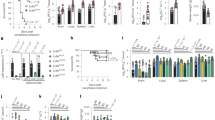Summary.
BCH4 cells, persistently infected with Human Respiratory Syncytial Virus (HRSV), were obtained by Fernie et al. [12] after infection of a BALB/c mouse embryo cell line with the Long strain of HRSV. To understand the basis of HRSV persistence, the expression of HRSV RNAs and proteins was evaluated in BCH4 cells and infected parental BALB/c and fully permissive HEp-2 cells. Production of viral mRNAs was severely impaired in BCH4 cells. In addition, the expression level of the surface glycoproteins F and G was markedly reduced relative to internal viral proteins. However, virus recovered from BCH4 cells could lytically infect HEp-2 cells and expressed normal levels of surface glycoproteins. No evidence of defective genomes or interfering particles was found in BCH4 cells. Taken together, these data indicate that reduction of both viral mRNA accumulation and surface glycoprotein biosynthesis are at the basis of HRSV persistence in BCH4 cells.
Similar content being viewed by others
Author information
Authors and Affiliations
Additional information
Accepted November 3, 2000
Rights and permissions
About this article
Cite this article
Martínez, I., Bustos, J. & Melero, J. Reduced expression of surface glycoproteins in mouse fibroblasts persistently infected with human respiratory syncytial virus (HRSV). Arch. Virol. 146, 669–683 (2001). https://doi.org/10.1007/s007050170138
Issue Date:
DOI: https://doi.org/10.1007/s007050170138




